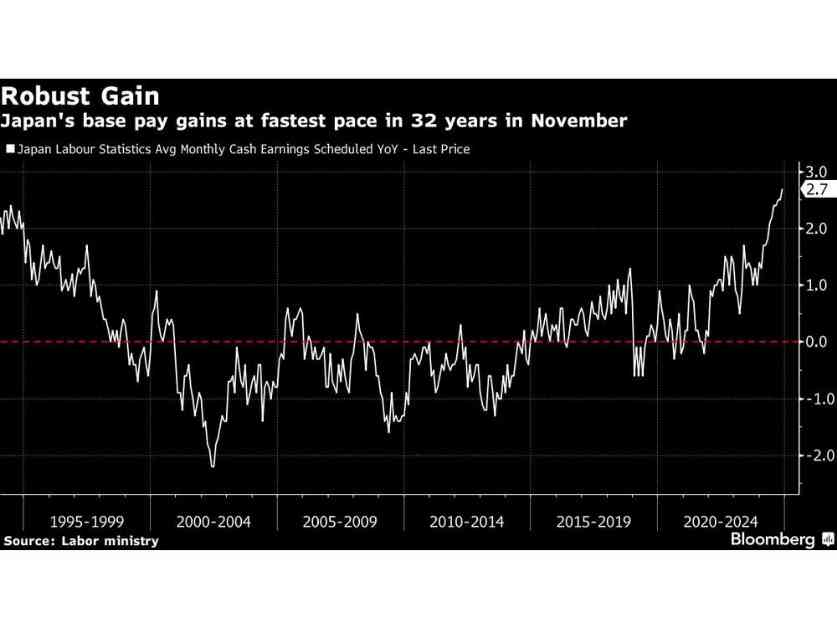**Japan’s Highest Base Pay Increase in 32 Years Fuels Rate-Hike Speculation**
Japanese workers received a significant boost recently as their base salaries saw the most substantial increase in 32 years. This surge in income hints at a positive economic trend emerging in the country, prompting expectations of additional rate hikes in the near future. The rise in base salaries by 2.7% in November from the previous year led to a 3% increase in nominal wages, surpassing economists’ expectations. This growth indicates a stable wage trend, with full-time workers witnessing a 2.8% increase in wages, maintaining levels at or above 2% for the past 15 months.
### **Implications for the Economy**
While these salary increments are promising, real cash earnings experienced a slight decline of 0.3% from the previous year, marking the fourth consecutive month of decrease. This stagnation in real wages can be attributed to inflation outpacing pay growth, particularly after the government ceased utility bill subsidies, causing energy costs to rise. Despite this setback, the consistent wage trend has reignited discussions about a potential rate hike by the Bank of Japan (BOJ) in the upcoming policy meeting.
### **BOJ’s Response and Market Speculation**
BOJ Governor Kazuo Ueda’s cautious stance post-December meeting has shifted market sentiment towards a delayed policy adjustment. Current overnight swaps indicate a 46% probability of a rate hike at the January meeting. Governor Ueda emphasized the need for more data to assess the sustainability of wage growth before considering further tightening measures, especially with the spring wage negotiations approaching.
### **Anticipated Developments and Company Initiatives**
The upcoming wage negotiations in March, spearheaded by the nation’s largest trade union federation Rengo, will play a crucial role in determining future wage hikes. Rengo aims for a minimum 5% wage increase across all companies, with a higher target of 6% for small and medium-sized enterprises to address income disparities. Encouragingly, companies like Aeon Co. and Nippon Life Insurance are already planning significant salary raises for their employees, reflecting a positive outlook on wage growth.
### **Expectations and Insights**
As Japan’s labor market remains tight, companies are under pressure to offer competitive salaries to attract and retain skilled workers. The upcoming BOJ meeting in January and subsequent events will provide valuable insights into wage trends and policy decisions. With Governor Ueda’s focus on the evolving wage landscape, observers anticipate a cautious approach towards monetary adjustments until the outcome of the spring wage negotiations becomes clearer.
This surge in base salaries not only signifies a positive economic shift in Japan but also highlights the importance of sustainable wage growth for long-term economic stability and prosperity. As the country navigates through these developments, the impact of enhanced salary structures on consumer spending, inflation rates, and overall economic growth remains a topic of keen interest and scrutiny.






















